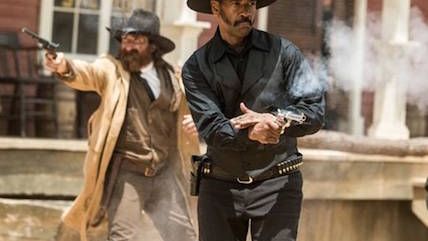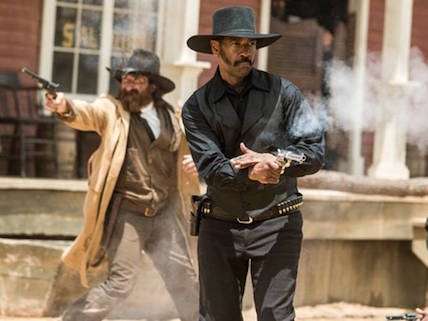Movie Reviews: The Magnificent Seven and Chicken People
Denzel Washington and Chris Pratt in a not-bad remake, and a visit to the world of competitive poultry.


The Magnificent Seven is of course a remake of John Sturges's famous 1960 Western, and of course it's been brought earnestly up to date. Now, instead of the marauding bandido who harried the defenseless villagers in the first film, we have a rapacious gringo (the words "robber baron" are actually uttered) who cites the tenets of capitalism and religion to justify his appropriation of the townsfolk's land. The Seven themselves are more ethnically diverse, too: there's an Asian knife fighter named Billy Rocks (Byung-hun Lee), a Mexican outlaw named Vasquez (Manuel Garcia-Rulfo), and a Native American arrow-master called Red Harvest (Martin Sensmeier). There's even a woman—a feisty widow named Emma (Haley Bennett)—who's a match for any of the men, bravery-wise, and might have been included among their number had it not been necessary for her to shed tears at one point, and to serve the guys dinner at another.
The story, set in the Old West of 1879, is familiar. Denzel Washington is an itinerant lawman named Chisolm, who is persuaded to come to the aid of some timorous citizens whose homesteads are about to be taken over by that evil robber baron, Bartholomew Bogue (Peter Sarsgaard), and his gunslinging henchmen. Chisolm knows he'll need help, so in addition to the above-noted roughnecks he recruits a Confederate war hero improbably named Goodnight Robicheaux (Ethan Hawke), a fat Indian-fighter named Horne (Vincent D'Onofrio), and a wise-cracking cardsharp named Faraday (Chris Pratt). Together, they amass a heaping cache of weapons and set about booby-trapping the town in anticipation of Bogue's arrival.
Washington, dressed all in black from his hat to his boots, is an instant icon of frontier badassery, and it's a pleasure to watch him work. And Hawke and Byung-hun conjure up easy rhythms of longtime compadres. But Pratt, starved of sharp lines, isn't always as much fun as you would hope; and the portly-plus D'Onofrio seems to be playing a Wild West version of Orson Wells. The rest of the Seven have their moments, but otherwise register minimally, some of them outshone by Bennett, whose distinctively sweet face and squint of steely determination add spine to a role that might have been little more than a genre cliché. Unfortunately, Sarsgaard's squirmy, over-underacted Bogue is a problem: he's too much of a worm to be truly dastardly, and after a while he mainly serves as wan comic relief.
Director Antoine Fuqua, who also directed Washington and Hawke in the 2001 Training Day (for which Washington won an Oscar), clearly loves Western movies, and he occasionally alludes to the grand tradition. There's a passing shot of a bad guy's corpse propped up in a coffin for public display that seems borrowed from Clint Eastwood's Unforgiven; and Fuqua's penchant for tight, circling close-ups of tense faces is pure Sergio Leone. (More novel is a death-by-many-arrows that strongly recalls a well-known scene in the first Lord of the Rings movie.)
Fuqua is also an unstinting action man, and while the movie is slow to get started, by the end, when a Gatling gun begins to chatter and bodies fly and all kinds of stuff starts blowing up, it finally delivers what you've come to see. (Well, mostly: the picture is rated PG-13, so there's not a lot of blood, and no sex at all, or even romance.)
Like the first Magnificent Seven, Fuqua's movie is derived from Akira Kurosawa's 1954 Seven Samurai, and I'd recommend either of those previous films over this one, which can't quite answer the question asked of all remakes: Why? It's not bad, but that's pretty much all it is.

Chicken People
If Errol Morris had ever wandered into the world of "competitive poultry," he might have been moved to make a documentary like Chicken People. As in some of Morris's films, director Nicole Lucas Haimes trains her camera on an eccentric subject—one of the hundreds of chicken-championship contests held across the country each year—and then gently dollies in on three veteran competitors, whose stories are equally curious, and unexpectedly moving.
We naturally learn a lot about chickens—Leghorns, Wyandottes, Silkies—and we marvel at their oddities. There's a poufy black bird the size of a small dog, a skinny one that suggests a normal chicken's head affixed to an experimental body, and another—a Mottled Hudan—that looks like an explosion in a feather factory. We learn about the standards they must meet and surpass ("nice even wattles," a comb "free from folds, twists, and excrescences") and the shortcomings that will disqualify them (no "duck-footed" entrants, no "vulture-like hocks"). It's a tough game.
As the annual Ohio National Competition draws close, we meet Haimes's featured players. Shari McCollough is a middle-aged divorcee living on a farm in Crawfordsville, Indiana, with five kids, 200 chickens, and a llama named Comet. Shari is a reformed alcoholic who climbed out of a dark personal hole with the help of her birds. "They gave me something to care about," she says. "My poultry is my life."
Brian Knox, likewise middle-aged and also Midwestern, builds automotive engines for tractor pulls, but is mainly obsessed with breeding championship chickens ("I'm a hatch-o-holic," he says). Brian is a shy, solitary man; he had a girlfriend once, but they broke up. "I miss her," he says. "I've kind of given up some things."
Then there's Brian Caraker, a bubbly 30-something man who makes his living singing in a '60s-music revue in the country fun mecca of Branson, Missouri. But Brian, too, lives for his chickens. He was viciously bullied in high school, and still suffers the aftereffects. "The chickens don't judge you," he says. Unfortunately, not having a real home of his own in Branson, he has to board his birds with his parents back in Illinois—not an ideal situation. "I don't have the agricultural release that I need," he says. Also, "My parents are not chicken people."
Like their fellow chicken folk, these three are good-hearted and guileless, sweetly supportive of one another even when the championship trophies elude their grasp. They live in another America, maybe a better one than the country portrayed in popular media. It's a place where no one gets mocked, and no one ever gives up. "I don't see a show-winner or a show-loser," Caraker says after one of his birds fails to prevail. "I see a part of my life."


Show Comments (124)